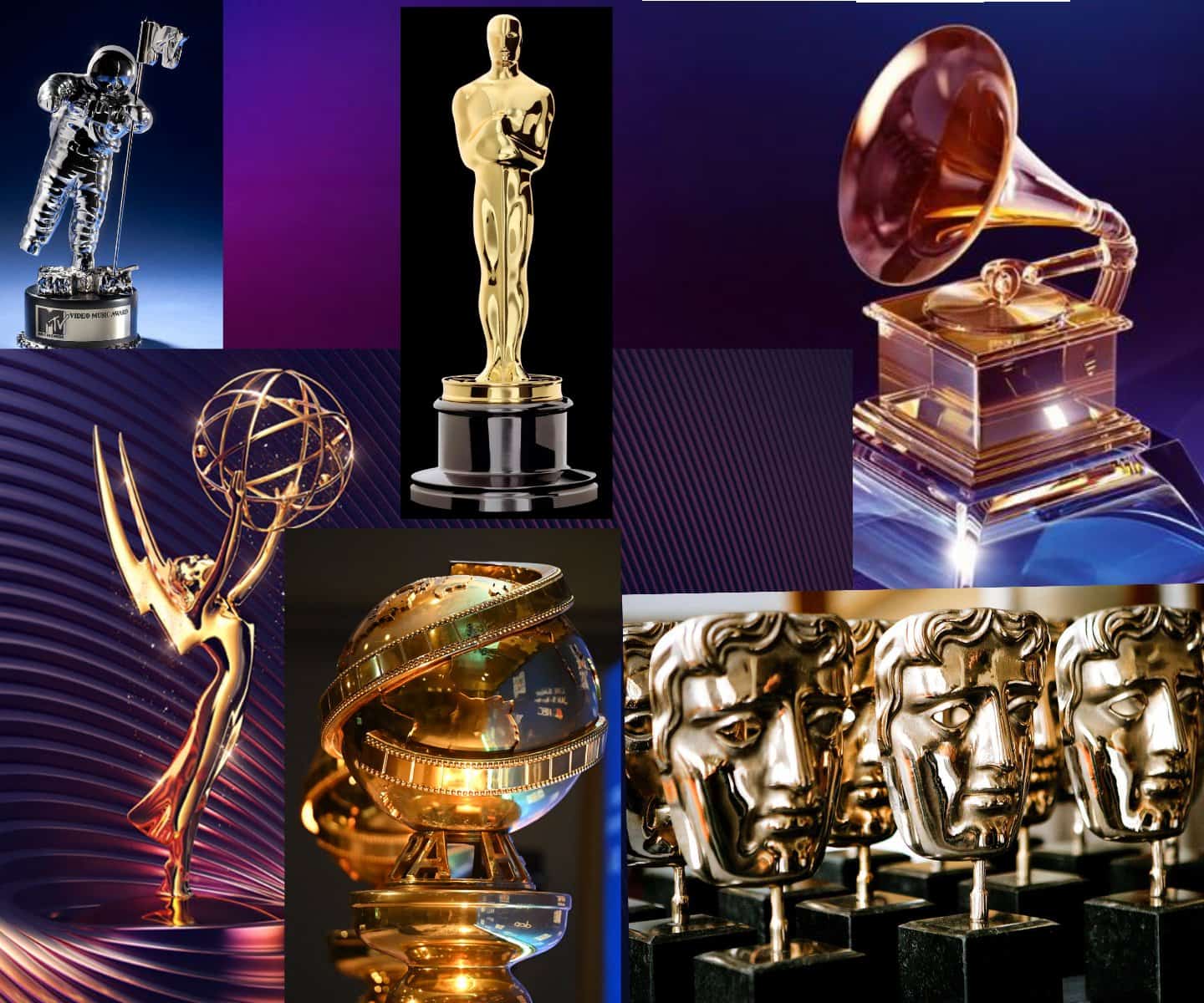The world of entertainment thrives on creativity, passion, and the relentless pursuit of excellence. But how do we celebrate these achievements? Enter the dazzling spectacle of award shows, where glittering trophies and emotional acceptance speeches become a testament to artistic brilliance. From the iconic golden Oscar statuette to the coveted Emmy statuette, these awards not only recognize talent but also generate immense cultural buzz and economic impact.
Beyond the Red Carpet: A History of Renowned Awards
FILM
Academy Awards (Oscars)
The Oscars reign supreme as the most prestigious film awards globally. Their history is rich with legendary moments, from the silent film era to groundbreaking special effects. While there’s no cash prize, the recognition can catapult careers and propel films to box office success. However, the Oscars haven’t been without controversy. Diversity and representation remain a point of contention, with calls for a more inclusive pool of nominees and voters.
Established in 1929 by MGM studios executives to improve the film industry’s public image, the Oscars quickly became the gold standard for cinematic excellence. The iconic statuette, depicting a knight holding a sword and film reel, is actually made of bronze plated in 24-karat gold. A fun fact: the Oscar statuette’s official name is simply “Academy Award of Merit.”

Golden Globe Awards
The Golden Globes recognize excellence in both film and television. These awards, known for their star-studded ceremonies and often humorous undertones, offer a unique perspective on the entertainment landscape.
Founded in 1944 by the Hollywood Foreign Press Association, a group of Los Angeles-based journalists covering the American film industry, the Golden Globes aimed to acknowledge both film and television achievements. The trophies are golden globes held aloft by a hand, symbolizing global recognition.
These awards often serve as a predictor for the upcoming Emmys and offer a unique perspective on the television landscape.

BAFTA Awards (British Academy Film Awards)
These prestigious awards celebrate British and international films. Similar to the Oscars, BAFTAs offer no cash prize, but the recognition carries immense weight within the film industry.
Established in 1947 by the British Film Academy, these awards were created to celebrate British filmmaking and promote its global reach. The iconic BAFTA mask, designed by Mitzi Cunliffe, represents the dramatic and tragic aspects of theater. The trophies are traditionally crafted from bronze, but during World War II, they were made of plaster due to metal shortages.

MUSIC
Grammy Awards
The Grammys are the preeminent awards in the music industry. Grammy winners receive a golden gramophone trophy, a symbol of artistic merit across various genres. However, the awards process has faced criticism for its perceived bias towards certain genres and artists.
Founded in 1959 by the National Academy of Recording Arts and Sciences (NARAS), the Grammys were established to recognize artistic achievement and technical proficiency across various music genres. The golden gramophone trophy, nicknamed “Grammy,” is a recognizable symbol of musical excellence.
Controversies: Over the years, the Grammys have faced criticism for perceived bias towards certain genres and artists, particularly in categories like hip-hop and R&B. The Academy has implemented reforms to address these concerns, including diversifying its voting membership.

American Music Awards (AMAs)
The AMAs recognize music based on fan votes. These awards, known for their energetic live performances, celebrate the music that resonates most with the public.
Founded in 1970 by Dick Clark, the AMAs were created as a fan-voted alternative to the Grammys. These awards celebrate the music that resonates most with the public, making them a true reflection of popular taste. The iconic pyramid-shaped AMA trophy is made of cast aluminum and gold-plated.

MTV Video Music Awards (VMAs)
The VMAs focus on music videos and popular culture. They have become a platform for innovative visuals and outrageous performances, sparking trends and generating social media buzz.
Established in 1984 by MTV, the VMAs were created to celebrate the burgeoning art form of music videos at a time when MTV dominated popular music culture. These awards have become known for their focus on innovative visuals, outrageous performances, and trendsetting moments. The VMA trophy, often referred to as a “Moonman,” is a stylized astronaut holding a lunar disc.

TELEVISION
Emmy Awards
The Emmys are the most prestigious awards for American television programming. They recognize excellence across various categories, from drama and comedy to reality shows and documentaries. Similar to film awards, the Emmys don’t offer cash prizes, but winning signifies critical and industry acclaim.
Founded in 1949 by the National Academy of Television Arts and Sciences (NATAS), the Emmys were established to recognize excellence in American television programming. Originally called the “National Television Awards,” they were renamed in honor of Vladimir Zworykin, a pioneer of television technology. The Emmy statuette, a winged woman holding an atom, represents the “muse of television.”
Fun Fact: There are actually multiple Emmy award ceremonies, each recognizing different sectors of the television industry. The Primetime Emmy Awards are the most prominent, celebrating primetime programming broadcast on networks and cable channels.

THEATER
Tony Awards
The Tony Awards are the highest honors for American Broadway theatre. Winning a Tony Award not only brings prestige to the production but can also significantly boost ticket sales.
Established in 1947 by Antoinette Perry, a Broadway actress, manager, and director, the Tony Awards were created to recognize excellence in Broadway theatre. The statuette, a winged figure holding a laurel wreath and a mask of comedy and tragedy, represents the dual nature of theater. Interestingly, the Tony Award is not made of gold, but rather bronze with a copper wash.

Laurence Olivier Awards
These awards recognize excellence in London theatre. Similar to the Tonys, winning a Laurence Olivier Award is a mark of exceptional achievement in the theatrical world.
Founded in 1984 by the Society of London Theatre, these prestigious awards were established to celebrate excellence in London theatre and are named after the renowned British actor Laurence Olivier. The Olivier statuette depicts a seated figure holding a stylized mask. Unlike the American Tonys, the Oliviers are known for their more streamlined and intimate ceremonies.

The Economic Powerhouse: Awards and the Entertainment Industry
Entertainment awards shows are a multi-million dollar industry. Beyond the glitz and glamour, they generate significant economic benefits:
- Boosting Ticket Sales: A win at a prestigious award show can significantly boost ticket sales for films, plays, and concerts. This can have a ripple effect, generating revenue for theaters, production companies, and artists.
- Increased Brand Value: Winning an award can significantly elevate the brand value of actors, directors, musicians, and even streaming services. This can lead to lucrative endorsement deals and increased viewership.
- Global Tourism: Award shows often attract international attention, boosting tourism to the host city. The influx of celebrities, journalists, and fans can generate significant revenue for hotels, restaurants, and local businesses.
- Sponsorship Opportunities: Major award shows attract a massive global audience, making them prime targets for corporate sponsorships. These sponsorships generate substantial revenue for the ceremonies themselves and contribute to the overall economic impact.
The Enduring Legacy of Entertainment Awards
While controversies may arise, and the validity of certain categories or judging processes might be debated, entertainment awards shows remain a powerful cultural force. They serve several key purposes:
- Celebrating Creativity: These awards recognize and celebrate the artistry, innovation, and storytelling prowess that define the entertainment industry. They provide a platform for diverse voices and stories to be acknowledged, inspiring future generations of creators.
- Promoting Excellence: By recognizing excellence, award shows set a standard for quality within their respective fields. This can motivate artists to push creative boundaries and strive for even greater achievements.
- Generating Public Interest: Award shows generate significant public interest, sparking conversations about movies, music, television shows, and theatrical productions. This increased visibility can lead to a wider audience discovering and appreciating these works.
- Uniting the Industry: Award shows bring together artists, filmmakers, musicians, actors, and industry professionals from across the globe. These ceremonies provide a platform for networking, collaboration, and fostering a sense of community within the entertainment industry.
The Future of Awards Shows:
The entertainment industry is constantly evolving, and award shows are adapting to keep pace. The rise of streaming services and digital media is challenging traditional definitions of film and television. Award ceremonies are grappling with how to fairly include these new formats while maintaining their historical significance.
Here are some of the ongoing discussions:
- Diversity and Inclusion: Increased representation in both nominees and voters is crucial to ensure that all voices are heard and celebrated.
- Fan Engagement: Award shows are exploring ways to incorporate fan voting and social media engagement to reflect the changing landscape of audience participation.
- Transparency and Fairness: Addressing potential biases within voting processes and ensuring fair competition across all platforms remain key priorities.
Despite the challenges, award shows are likely to remain a fixture in the entertainment landscape. As these ceremonies evolve, they will continue to celebrate artistic excellence, inspire creativity, and capture the magic of entertainment for audiences worldwide.
Conclusion
From the iconic golden Oscar statuette to the coveted Emmy award, these glittering accolades represent the pinnacle of achievement in the entertainment industry. Beyond the red carpet glamour and acceptance speeches, award shows hold the power to inspire generations of artists, spark cultural conversations, and celebrate the enduring magic of storytelling.










+ There are no comments
Add yours